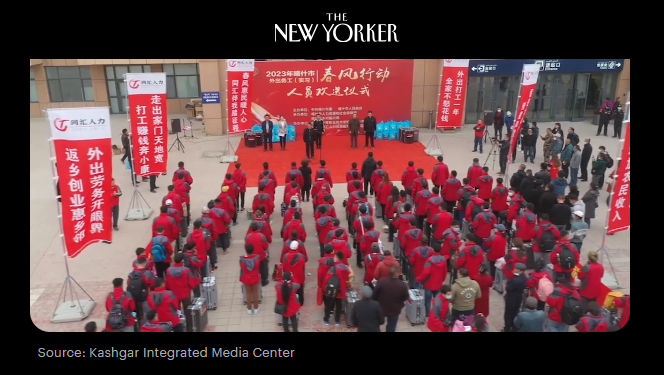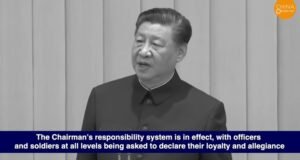
Uyghurs forced to queue up at a Chinazi "job fair"
The New Yorker reports on their investigation into how Uyghurs have been coerced into taking seafood industry jobs far from their homes in order to get themselves or a family member out of China’s notorious Xinjiang concentration camps. In the article, Ian Urbina looks at why the seafood industry in particular has escaped international scrutiny and U.S. sanctions compared to other industries that have been accused of using forced labor in Xinjiang. The seafood from these processing plants ends up in major US supermarkets as well as in many restaurants nationwide.
The Chinese Communists are attempting a genocide of Uyghur culture in order to “integrate” the people of Xinjiang into the national lockstep. To accomplish this, the Uyghurs are being systematically persecuted, imprisoned, and “reeducated” by means including torture. The program of sending Uyghurs to work elsewhere, such as in seafood-processing plants near the coast, helps divide up the problem (from the Chinazi point of view), as well as provide needed labor to a favored business. Urbina writes:
In the early two-thousands, China began transferring Uyghurs to work outside the region as part of an initiative that would later be known as Xinjiang Aid. The region’s Party secretary noted that the program would promote “full employment” and “ethnic interaction, exchange and blending.” But Chinese academic publications have described it as a way to “crack open” the “solidified problem” of Uyghur society in Xinjiang…
Ian Urbina, “The Uyghurs Forced to Process the World’s Fish”, The New Yorker
The employees-to-be sign contracts to take these positions, but they do so in order to get out of a concentration camp or prevent a family member from being sent to one. Their continued willing participation is ensured by the same threats.
The seafood industry has not been the target of sanctions, because they are physically distant from Xinjiang, where the international ire has been focused. Further, the downstream companies trying to audit their suppliers must rely on the reporting from the companies and these companies can simply not report their Uyghur laborers. The New Yorker researchers were even stymied by trying to get a look at the employees of one seafood-processing plant as the laborers were all uniformly suited up in laboratory outfits. Urbina and his colleagues divined some of their findings by looking at posts that Uyghur laborers made to social media. The social media, like everything in Communist China, is carefully watched, so the messages expressed might be interpreted as mournful words only for those with ears that can hear.













